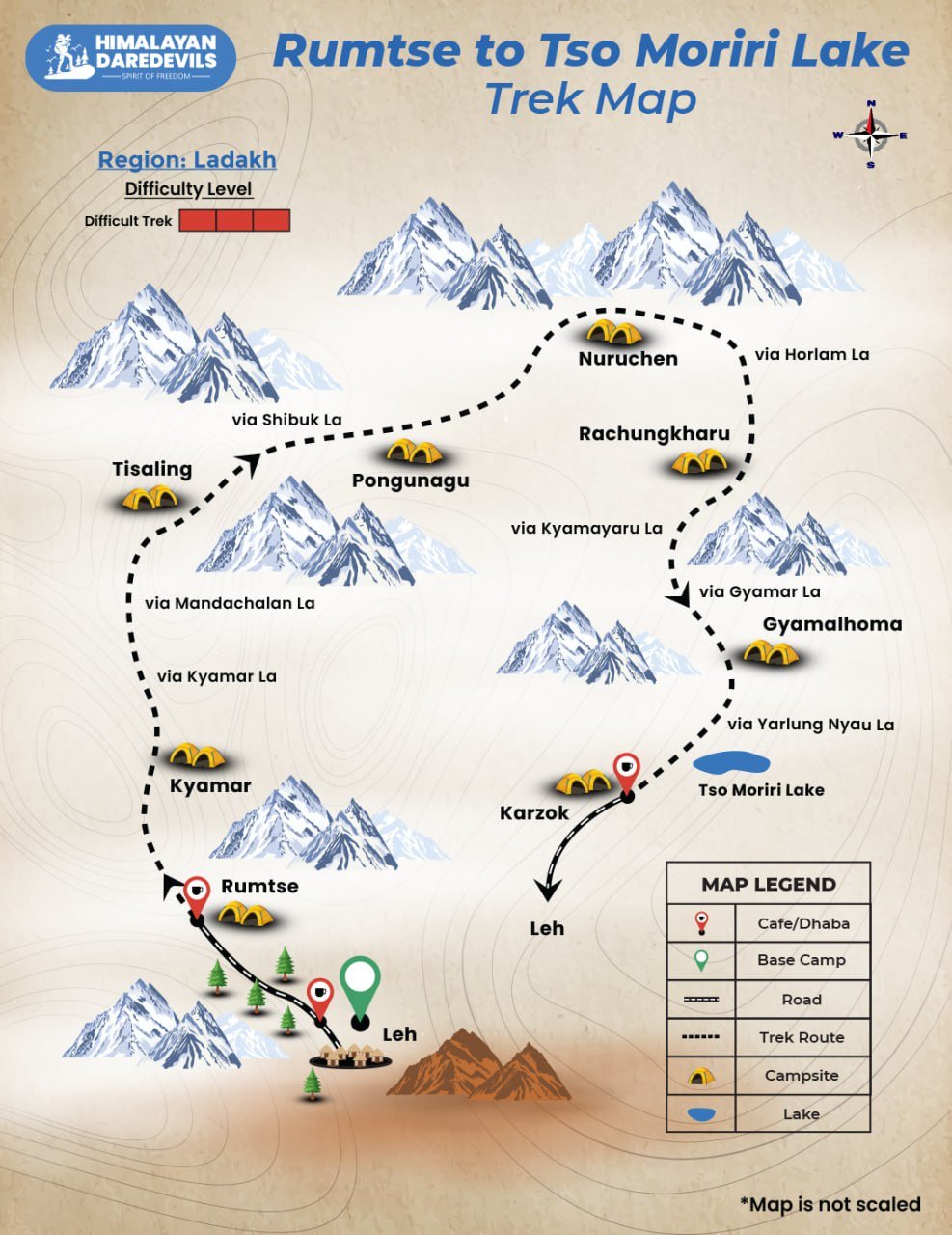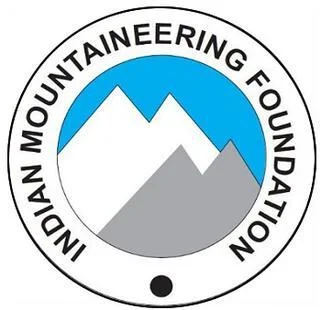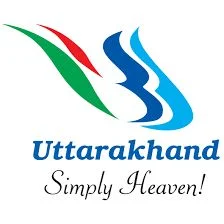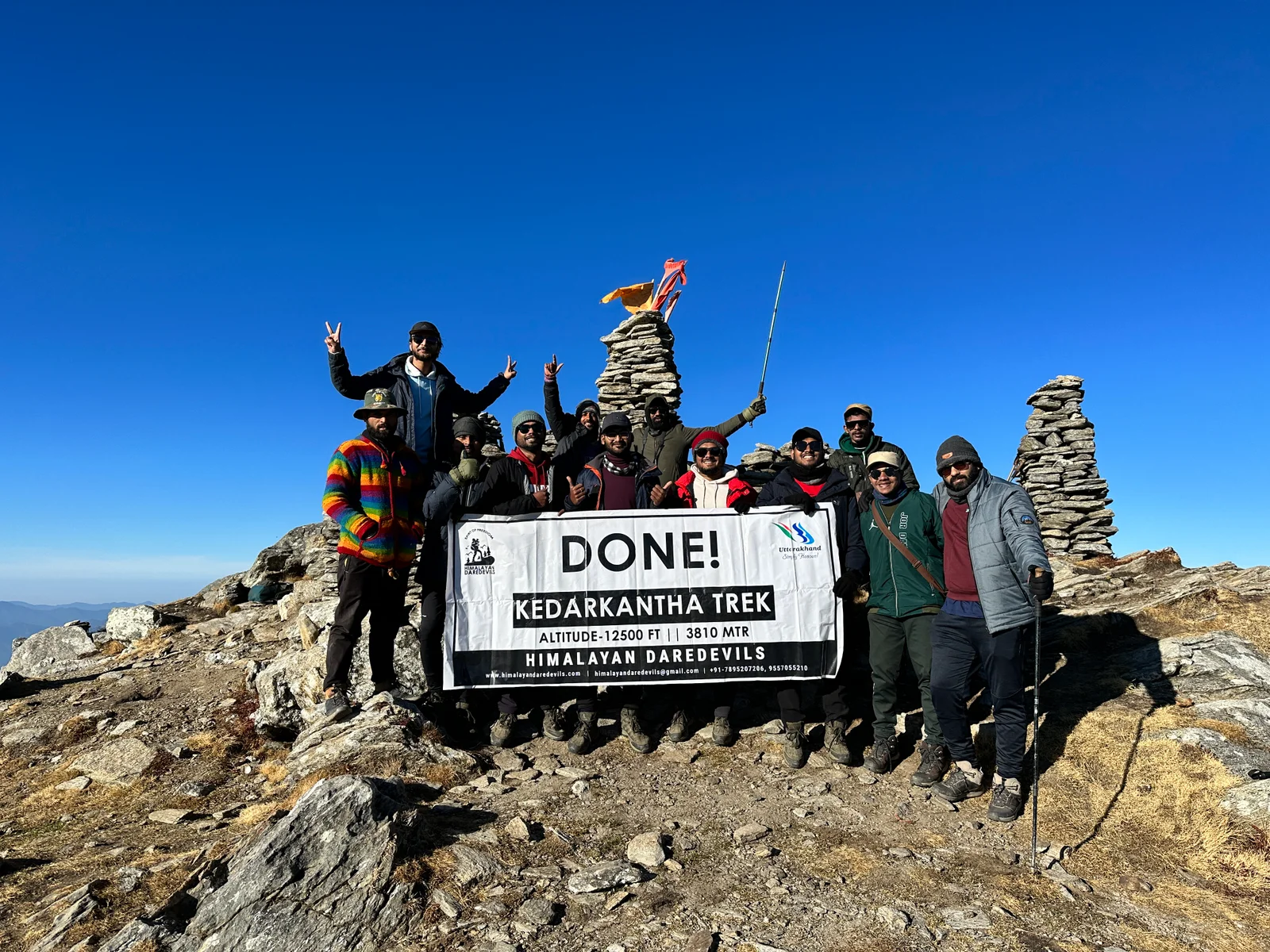Starting From
62,100
54,000.00
Starting From
62,100
54,000.00
Rumtse to Tso Moriri Lake Trek (269+ Reviews)
Trek starts from Rumtse and ends in Karzok
Jammu Railway Station
Kushok Bakula Rimpochee Airport
Leh
June, July and August
Leh to Leh
Veg
Camping
Leh
9 Days
Difficult
17880 ft
106 km
Overview
Rumtse to Tso Moriri Trek: The Largest High Altitude Lake in the Himalayas
Rumtse to Tso Moriri Trek lies in the Jammu and Kashmir region. Tso Moriri is the largest high altitude lake within Ladakh covering 40 km flanked by the Greater Himalayas and Trans Himalayas. The trek from Rumtse to Tso Moriri is one of the most picturesque treks in Ladakh. The trail passes through the Changthang region; it is a plateau with exotic landscapes and unique lakes like Tso Kar and Tso Moriri.
The Legend Behind Rumtse to Tso Moriri Trek
The interesting story behind Tso Moriri’s name is – A Chomo (Buddhist nun) woman was riding on a Yak and somehow got carried into the lake, the Yak started drowning into the water and the scared woman cried “Ri Ri” for help until she drowned. Then the lake got its name “Chomoriri”.
Itinerary
- Distance: 75 km drive
- Duration: 3 hour drive
- Altitude: 11, 560 ft – 13,450 ft
Start the day early, around 7:00 AM, The journey typically takes around 5-6 hours, covering a distance of approximately 75 kilometers.Enjoy the picturesque drive through the Ladakh region, taking in the breathtaking landscapes, rugged mountains, and barren terrains. Reach Rumtse by early afternoon, around 1:00 PM. Rumtse is a small village situated at an altitude of approximately 4,100 meters (13,450 feet) above sea level.
After resting for a bit, it’s advisable to engage in light activities to help your body acclimatize. You can take short walks around the village, but avoid strenuous exertion.
- Distance: 9 km
- Duration: 4-5 hours
- Altitude: 13,450 ft – 15,255 ft
Begin your trek from Rumtse, following the well-marked trail that leads towards Kyamar. The initial part of the trek may involve ascending gentle slopes and crossing open terrain. The trail might include some rocky patches,
Reach Kyamar, Get comfortable, and take in the stunning mountain scenery that surrounds Kyamar. and stay overnight there
- Distance: 15 km
- Duration: 8-9 hours
- Altitude: 15,225 ft – 16,896 ft – 16,240 ft
Start the day’s trek by ascending towards Kyamar La, a high mountain pass This part of the trail may involve steeper sections, so proceed at a steady pace.
Once you reach the pass, take a moment to catch your breath and soak in the breathtaking panoramic views of the surrounding peaks and valleys. After spending some time at Kyamar La, begin the descent into the valley. The trail may be rocky and uneven,
Reach Tisaling, a beautiful camping spot situated at an altitude of around 4,950 meters (16,240 feet) above sea level.
- Distance: 15 km
- Duration: 6-7 hours
- Altitude: 16,240 ft – 16,896 ft – 14,470ft
Start the day’s trek by ascending towards Shibuk La, a mountain pass. The trail may involve steep sections, Once you reach Shibuk La enjoy the stunning panoramic views of the surrounding landscapes
Continue along the trail, which may lead you through varied landscapes, including meadows and rocky terrain. Reach Pongunagu, the campsite situated near Tso Kar Lake, and stay overnight there
- Distance: 16 km
- Duration: 6-7 hours
- Altitude: 14,470 ft to 14,432 ft
Start the day’s trek from Pongunagu, following the trail that leads towards Nuruchen. The trail may involve some ascending and descending sections, Reach Nuruchen, a campsite along the route.
- Distance: 9 km
- Duration: 3-4 hours
- Altitude: 15,14,432 ft – 16,000 ft – 15,800 ft
Begin the day’s trek by ascending towards Horlam La, a mountain pass The trail may involve steep sections, Once you reach Horlam La enjoy the views of the surrounding landscapes. Reach Rachungkharu, and stay overnight there.
- Distance: 13 km
- Duration: 6 hours
- Altitude: 15,800 ft – 17,500ft – 17,700 ft – 16,700 ft
Start the day’s trek by ascending towards Kyamayaru La, a mountain pass Once you reach Kyamayaru La, enjoy the views of the surrounding landscapes
Reach Gyamalhoma, at your camping spot
- Distance: 14 km
- Duration: 6 hours
- Altitude: 16,700 ft – 17,7000 ft – 14,995ft
Start the day’s trek by ascending towards Yarlung Nyau La, a mountain pass Once you reach Yarlung Nyau La, Continue along the trail, which may lead you through varied landscapes, including meadows and rocky terrain. The trek will eventually take you to Karzok.
Reach Karzok, a village situated at the northwestern shore of Tso Moriri Lake, and stay overnight there
- Distance: 211 km drive
- Duration: 5 to 6 hours drive
- Altitude: 14,995 ft – 11,560 ft
Prepare to depart from Karzok. Depending on road conditions and weather, it’s advisable to start early in the morning, around 7:00 AM, to make the most of the day.
Rumtse to Tso Moriri Lake Trek Map

Inclusions
Exclusions
1. Meals while on trek (Veg.).
2. All necessary entry fees and permits.
3. Accommodation:- Guest house / Camping during Trek.
4. Mountaineering qualified & professional trek Leader, guide, cook, and Support staff.
5. First aid medical kits, stretcher, and oxygen cylinder.
6. Trek equipment: Sleeping bag, mattress, tent, kitchen & dining tent, toilet tent, utensils, and crampon (if required)
7. Staff Insurance.
8. Porters/mules to carry central equipment.
1. Any kind of personal expenses.
2. Food during transit.
3. Mules or porters to carry personal luggage.
4. Insurance.
5. Transport (Non Ac)
6. Any kind of emergency evacuation charges
7. 5% GST
8. On first day En Route to base camp the Breakfast and Lunch are Not Included
9. Last Day En Route Lunch and Dinner are Not Included
10 .Any expense incurred or loss cost by reasons beyond our control such as bad weather, natural calamities (landslides, floods), flight delays/rescheduling/ cancellations, any accidents/medical evacuations, riots/strikes/war/pandemics etc.
11. . Anything not specifically mentioned under the head.
1. Meals while on trek (Veg.).
2. All necessary entry fees and permits.
3. Accommodation:- Guest house / Camping during Trek.
4. Mountaineering qualified & professional trek Leader, guide, cook, and Support staff.
5. First aid medical kits, stretcher, and oxygen cylinder.
6. Trek equipment: Sleeping bag, mattress, tent, kitchen & dining tent, toilet tent, utensils, and crampon (if required)
7. Staff Insurance.
8. Porters/mules to carry central equipment.
1. Any kind of personal expenses.
2. Food during transit.
3. Mules or porters to carry personal luggage.
4. Insurance.
5. Transport (Non Ac)
6. Any kind of emergency evacuation charges
7. 5% GST
8. On first day En Route to base camp the Breakfast and Lunch are Not Included
9. Last Day En Route Lunch and Dinner are Not Included
10 .Any expense incurred or loss cost by reasons beyond our control such as bad weather, natural calamities (landslides, floods), flight delays/rescheduling/ cancellations, any accidents/medical evacuations, riots/strikes/war/pandemics etc.
11. . Anything not specifically mentioned under the head.
What to carry
- Trekking shoes: A good pair of trekking shoes is essential for a comfortable and safe trek. Look for shoes that are sturdy, provide good ankle support, and have a good grip on different types of terrain.
- Backpack with rain cover (50-60 ltr): A backpack is necessary to carry all your gear. Make sure it's the right size for your trek, and comes with a rain cover to keep your belongings dry in case of rain.
- Thermals (upper and lower): Thermals are lightweight and comfortable base layers that help regulate your body temperature in cold weather. Bring both upper and lower thermals to keep warm.
- 3 T-shirts (advisable quick dry): Choose quick-drying T-shirts made from breathable and moisture-wicking materials. This will help keep you cool and dry during your trek.
- 2 trek pants: Choose lightweight and comfortable trek pants that are easy to move in and can dry quickly if wet.
- Jacket (-10 degrees): A warm jacket is essential for cold weather. Choose a jacket that is waterproof and windproof, and provides good insulation.
- Fleece or hood (2): Fleece jackets or hoodies are great mid-layer options to keep warm. Bring at least two, as they can also be used as an extra layer at night.
- Sunglasses (UV protected): Protect your eyes from the sun's harmful UV rays with sunglasses that are designed for outdoor activities.
- Sun cap: A sun cap or hat with a brim will protect your face and neck from the sun.
- Hand gloves: Bring a pair of lightweight gloves to keep your hands warm and protected from wind and sunburn.
- Woolen cap: A woolen cap will keep your head and ears warm at night or in cold weather.
- Socks (3 pairs min): Bring at least three pairs of good quality socks that are moisture-wicking and provide good cushioning and support for your feet.
- Headlamp: A headlamp will come in handy if you're hiking in low-light conditions or need to find your way in the dark.
- Trekking pole (if needed): Trekking poles can help reduce strain on your legs and provide additional support on steep terrain.
- Rain cover\poncho: A rain cover or poncho will keep you and your gear dry during unexpected rain showers.
- Day pack (if you plan to offload your bag): If you plan to offload your backpack during the trek, bring a smaller day pack to carry essentials like water, snacks, and a first aid kit.
- A toiletry kit: Bring a small kit with personal hygiene items, such as a toothbrush and toothpaste, wet wipes, hand sanitizer, and toilet paper.
- Lunchbox, cup, spoon: If you plan to bring your own food, bring a lunchbox, cup, and spoon to carry and eat your meals.
- 2 one-liter bottles: Staying hydrated is crucial, so bring at least two one-liter bottles to carry water.
- 2-3 plastic covers to keep your wet or used clothes: Plastic bags are useful for keeping wet or dirty clothes separate from the rest of your belongings. They can also be used to pack out any trash or waste you generate during the trek.
How to reach
Travel to Leh Ladakh by air
Flying is the fastest and most convenient way to reach Leh. Leh’s Kushok Bakula Rimpochee Airport is a small but well-connected airport that has regular flights from major cities like Delhi, Srinagar and Mumbai. Airlines like Air India, GoAir and Vistara ensure smooth connectivity. The aerial view as you land in Leh is a sight, with snow-covered peaks and endless mountains below you.
But flying directly to Leh has a catch: altitude sickness. The sudden jump to over 11,000 feet above sea level can cause Acute Mountain Sickness (AMS) which gives you headaches, nausea and fatigue. To avoid discomfort, travellers are advised to spend their first day resting and acclimatizing. Hydration and light food can also help alleviate symptoms. Flying is perfect for those who are short on time but want to see the treasures of Ladakh.
Fitness and preparation guide for Rumtse to Tso Moriri Lake Trek
We recommend jogging as the best routine to get fit for a trek. It works on the same muscles that you use while trekking — your calves, glutes and hamstrings. It helps increase your stamina day by day. It is also an easy routine that does not require any equipment or tools.
Fitness target:
To do this trek comfortably, you must be able to cover 5 km in under 35 minutes. This is the minimum fitness required for this trek.
How to achieve this fitness?
- Start jogging at least 4 days a week
- If you cannot run 5 km immediately, start with 2 km and increase to 5 km over 2-3 weeks.
- Once you’re able to run 5 km, increase your pace day by day.
- Gradually increase your pace and bring it down to 5 km in less than 35 mins.
- You must be able to run 5 km in 35 mins consistently for at least 2 weeks before the trek.
This trek requires at least 6-8 weeks of preparation. The longer, the better. So plan your trek soon and start preparing.
Cancellation policy
Life is unpredictable and we understand sometimes you have to cancel or change your trip dates and it is our endeavour to make it as easy possible for you. However, please understand we plan everything including guide fees, permits, accommodation and ration in advance. Therefore any cancellation means inconvenience and certain losses to the people involved in various stages of programme. Keeping that in mind, our cancellation charges are as below-
Cancellation prior to 30 days from start of the event: Get monetary refund with 15% of cancellation charges on trek fee.
Cancellation between 30 days and 15 days to the start of event: 50% on trek fee is non refundable and the remaining 50 % will be given as cash voucher which is valid for 1 year.
Cancellation less than 15 days to the start of event: No refund.
Please note cancellation will be only accepted by email.
Booking amount is non refundable
Note: The Himalayan Daredevils reserves the right to cancel a programme before departure in the event of logistical problems arriving due to natural calamities, strikes, wars on any other circumstances that makes the event inadvisable. In this case, 50% on trek fee is non refundable and the remaining 50 % will be given as cash voucher which is valid for 1 year.
Itinerary changes & trip delays:
We plan itineraries based on the information at the time of planning and in rare circumstances, there are subject to change. In the event that the itinerary is changes or delayed due to unforeseen circumstances such as bad weather conditions, transportation delays, government intervention, landslides etc. We will always aim to give you the best experience possible. However The Himalayan Daredevils are not be held responsible for the cost of delay or changes.
Why Choose Us




